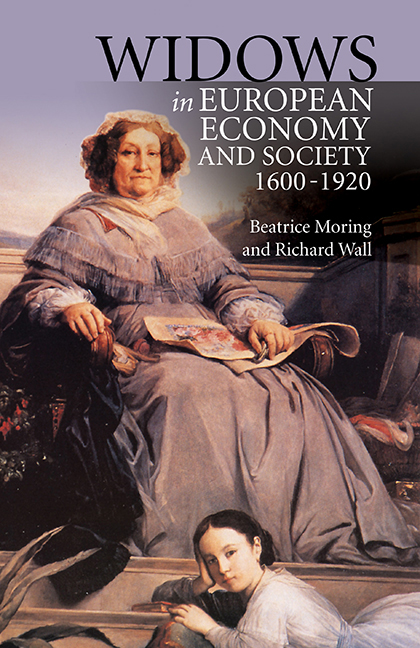Book contents
- Frontmatter
- Contents
- List of Plates
- List of Tables
- Acknowledgements
- Introduction
- 1 Widows and Poverty
- 2 Widows, Legislation and Property
- 3 Assessing the Assets of the Widow
- 4 Life Interest, Usufruct or Pension, The Mainstay of the Widow?
- 5 Urban Widows, Economy and Family
- 6 The Demography of Widowhood
- 7 Household Structure, Age, Social Status and Geography
- Conclusion
- Appendices
2 - Widows, Legislation and Property
Published online by Cambridge University Press: 30 August 2017
- Frontmatter
- Contents
- List of Plates
- List of Tables
- Acknowledgements
- Introduction
- 1 Widows and Poverty
- 2 Widows, Legislation and Property
- 3 Assessing the Assets of the Widow
- 4 Life Interest, Usufruct or Pension, The Mainstay of the Widow?
- 5 Urban Widows, Economy and Family
- 6 The Demography of Widowhood
- 7 Household Structure, Age, Social Status and Geography
- Conclusion
- Appendices
Summary
IN The Development of Family and Marriage in Europe, Jack Goody argued convincingly that no purely patrilineal descent groups have existed in Europe in the post-Roman period. While the inheritance system favoured males, it was bilateral in essence. Allocating a dowry or dower or direct inheritance rights to property were a means of transmitting patrimonial property to women. Land has been of great importance for ordinary farmers in the past. The line, however, has not, as among the aristocracy, been viewed as descent through males only, from a more or less mythical ancestor. The essential kinship group was the immediate family, including parents, children, siblings and their offspring, and/or relations that had taken up residence and contributed to the work of the family group.
The consequence of such an approach was that, in the absence of a son, land could be inherited by a daughter. If the family had both sons and daughters, the daughters and younger sons would be provided with dowries that could be removed to wherever the child took up residence at marriage. The property available for a woman at widowhood, therefore, depended on how much she was given or inherited initially and what risks to such property arose from her marriage. In addition, her economic status was naturally affected by how much of her husband's property she could lay claim to.
The economic position of women was affected, on the one hand, by conceptions of the patrimony, the family property, and, on the other hand, by notions of male hegemony within marriage. While most fathers firmly believed in male authority over women, many were suspicious of other men meddling with their family property. The inheritance was there for the daughter and grandsons, who were of the same blood, not for the son-in-law, who had a different family background.
Family, Property, Husband and Wife
The question of how far property was to be united in marriage was an issue that already concerned the ancient Romans. By the early imperial period the dowry of the wife was no longer transferred to her husband's family.
- Type
- Chapter
- Information
- Widows in European Economy and Society, 1600-1920 , pp. 67 - 80Publisher: Boydell & BrewerPrint publication year: 2017



